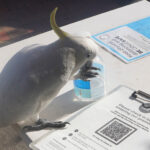Getting Pfizer jabs into Australia’s smallest arms will come with a few challenges of its own.
Covid shots for children under 12 have been okayed. Here’s why it might be different to regular childhood vaccinations, and some practical steps to help calm needle-phobic young people.
Now with ATAGI’s endorsement for two shots eight weeks apart, the TGA has provisionally approved a modified Pfizer vaccine to be given to children aged between five and 11 from 10 January next year.
The dosage is about one-third of that used in adults, and the vials will have an orange cap to distinguish them from an adult dose.
Moderna has also applied for its vaccine to be used in children aged between six and 11.
Although the government hasn’t ruled out using the school-based vaccination clinic model entirely, the summer-holidays start date suggests that primary care will once again be at the centre of the rollout.
Given that routine childhood vaccinations finish at around four years old, and school-based adolescent vaccinations don’t start until children are around 12, the five- to 11-year-old cohort don’t typically present for immunisations.
Associate Professor Nicholas Wood, a paediatrician with the National Centre for Immunisation Research and Surveillance, told The Medical Republic that the five-to-11 cohort were likely to be anxious and unlikely to remember previous vaccination experiences.
“At that primary school age there’s likely to be some anxiety, some needle phobia [because] they’re not really used to getting vaccines in the school setting, which we do for high schools, [and will not remember their infant vaccines],” he said.
This reporter is no stranger to a fear of needles. When I was about eight, I went off to my trusty GP for some pre-travel vaccinations and ended up crawling beneath a chair in his office, refusing to get my second jab.
My mum had to crack out her sternest I’ve-been-a-nurse-for-20-years-and-this-is-deeply-embarrassing look to get me to comply, and even then I screamed loud enough for the whole practice to hear.
Dealing with needle-phobic children will require a combination of techniques, according to Professor Wood.
Where children on the younger end are more likely to respond to parental cajoling and the promise of rewards, doctors can appeal to the more rational side of the older children.
“We like this age group to have what we call assent,” he said.
“The actual formal consent must be given by the parent or the guardian, but the kid should be involved in the decision making.”
The Murdoch Children’s Research Institute, meanwhile, suggests encouraging parents not to over-discuss vaccination with children prior to arrival, as this can build up fear, and to attempt to distract children during the jab.
Just like adults, Professor Wood said, some children will be on the fence or will have been influenced by media.
“I suspect that this age group know [a small amount], because you can’t turn the TV or radio on without hearing the word vaccine,” he said.
“Some kids will be saying, ‘well, mum and dad and my older siblings got it, I want it’ and will charge in and get it, whereas other kids will probably be saying, ‘well, you know, I’m just not sure about this.’”
Because of this dynamic, Professor Wood believes that age-appropriate materials will be essential to the rollout.
These may include simplified vaccine information handouts, or short videos explaining the role of the vaccine and what side effects children may experience.
For children who are intensely needle-phobic, Professor Wood said that hospital clinics often used virtual reality headsets to distract children. In some extreme cases, he said, nitrous oxide is used.
“When we go to that level, though, it’s very much an individual decision or discussion with the parent about what they’ve done in the past and what they think might be likely to work this time,” he said.
Note: This story has been updated to reflect ATAGI’s endorsement.





